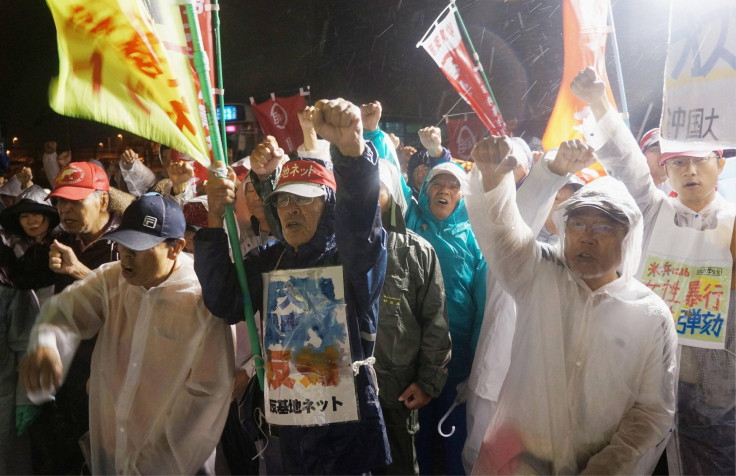US Solidarity Effort In Okinawa Suffers Setback As Serviceman Assaults Teenager

Japanese authorities have launched a probe into the allegations that a U.S. serviceman assaulted a teenager that stood in violation of a curfew on the U.S. military personnel in Japan and hurt American efforts to reassure solidarity with the Okinawans following the recent incident of rape involving the troops.
An airman assigned to the Kadena Air Base on Okinawa allegedly broke into an apartment above a bar in an inebriated state and hit a 13-year-old boy in the face and broke a television set in the early hours of Friday. The perpetrator proceeded to jump from a balcony on the third floor and was taken to a hospital. The teenager has been examined and released by the hospital, Okinawan authorities were cited as saying by the Wall Street Journal.
Japan’s Foreign Ministry has lodged a complaint with U.S. envoy John Roos while Foreign Minister Koichiro Gemba described the alleged incident as "outrageous,” the Japanese media reported.
The incident, which occurred just weeks after a local woman was allegedly raped by two U.S. servicemen, has raised questions on how strictly the conditions of the night-time curfew are being enforced on the U.S. troops.
Okinawan police allege Seaman Christopher Browning of Athens, Texas, and Petty Officer 3rd Class Skyler Dozierwalker of Muskogee, Oklajoma, raped and robbed a local woman in her 20s outside her apartment building Oct. 16. The sailors, both 23, were on a temporary deployment to Japan with their unit.
In an attempt to soothe the anger among the Japanese over the rape, the U.S. enforced a mandatory curfew in mid-October that prohibited military personnel from leaving their bases between 11 p.m. and 5 a.m. and were asked to undergo “core values training.”
According to a BBC report, there are about 26,000 U.S. troops based on the southern Japanese island of Okinawa which was a major battlefield during World War II and a U.S.-administered territory until 1972. The crimes committed by service personnel on the island against the local residents have become a source of persistent friction between both the nations.
Many Okinawans reportedly believe the troops cannot be trusted to behave themselves outside their bases while the military personnel believe they are being unfairly judged and their liberties restricted because of a few notorious cases.
The American decision to deploy the Marines' MV-22 Osprey hybrid aircrafts to Futenma base in Okinawa Oct. 1, despite the local opposition over the safety concerns after two recent crashes elsewhere, has also contributed to the tensions with Japan.
Okinawa Governor Hirokazu Nakaima is a vocal critic of the size of the U.S. presence on the island.
The Japanese officials in Okinawa have been calling for a revision of Status of Forces Agreement (SOFA) signed by the U.S. and Japan, according to which the U.S. service members, suspected of involvement in a criminal case if first detained by the U.S. military, will remain in their custody until they are indicted by Japanese authorities.
However, the U.S. government is reluctant to review the SOFA provisions, which could lead to similar demands from other nations where the U.S. service members are stationed.
Tokyo remains hesitant to give in to the demands raised by Okinawan lawmakers and residents to review SOFA provisions as Japan hosts the U.S. military installations for its own protection.
A U.S. Navy sailor was found dead with a head injury at a train station in Nagasaki Prefecture Sunday, leading to the speculations that the death reflected possible repercussions of the crimes committed by Americans against the natives. The Japanese officials, investigating the death of Petty Officer 2nd Class Samuel Lewis Stiles whose body was discovered surrounded by cans of liquor, treat the case as an accident or crime.
© Copyright IBTimes 2024. All rights reserved.












